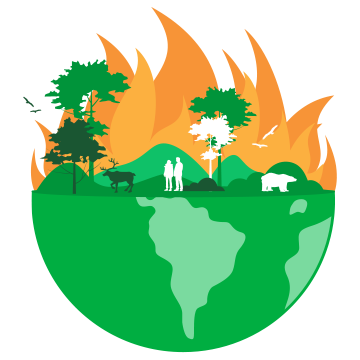Astronauts can see first-hand what we often only see in satellite pictures. Throughout the years, many space explorers reported a cognitive shift we now know as the Overview Effect – the experience of seeing the reality of Earth in space, which is immediately understood to be a tiny, fragile blue marble, shielded and sustained by a paper-thin atmosphere. From space, borders vanish, conflicts that divide people become less important, and the need to create a planetary society with the will to protect this little ball hanging in the void becomes imperative.
For the people watching us from up there, that feeling might have never been so strong and urgent as it is today.
Algeria, Canada, Greece, Italy, Tunisia, Turkey, United States, and Siberia are just some of the countries that are burning at the time this article is being written. Most of them, if not all, are linked to climate change, responsible for causing more dangerous weather conditions – higher temperatures and less rainfall.
Four hundred kilometers away from Earth, in the International Space Station, Thomas Pesquet and Megan McArthur can see the devastating effects of these wildfires across the globe in just 90 minutes (the time it takes ISS to orbit Earth).
In a Twitter publication, the European Space Agency astronaut Pesquet shows the disturbing effect of a wildfire in Greece and alarms everyone: “Yesterday, the United Nations released a report clearly stating our climate is changing, and we need to make hard choices as a species to avoid the worst”.
Fires in Peloponnesos, Greece. Yesterday @UN‘s @IPCC_CH released a report clearly stating our climate is changing and we need to make hard choices as a species to avoid the worst. My heart goes out to all affected by the 🔥 and the intense heat in the Mediterranean and California pic.twitter.com/albhYJmjp8
— Thomas Pesquet (@Thom_astro) August 10, 2021
In the short-term, wildfires pose a threat to destroy the lives and livelihoods of millions of people but, in the long-term, they might pose an even greater risk. After the loss of vegetation, the soil becomes hydrophobic (prevents water absorption), which ultimately contributes to flash floods and the introduction of heavy metals from ash and soil to infiltrate the waterways. Moreover, as the forests burn, vast amounts of smoke are released into the atmosphere. Such smokes can travel long distances, leading to numerous health issues, even in populations that were not at immediate risk of getting their infrastructures burned by the wildfires. In 2019, UNICEF reported 10 million Indonesian children were at risk from air pollution due to forest fires.
Looking at the near future, the outline intensifies. A new report from the United Nations’ Intergovernmental Panel on Climate Change (IPCC) warns that “fire weather” will probably increase by 2050 all over the globe. By “fire weather”, the experts mean more days where conditions are warm, dry, and windy enough to trigger and sustain wildfires.
Unfortunately, fires are only one of the concerns Humanity will have to face in the not-so-distant future. In an interview directly from the ISS with Business Insider, NASA’s McArthur also warns about other signs of climate change: “Big tropical storms — those are always coming, and potentially the flooding that comes after them […] We can see all of those effects from up here.”
“Climate change is already affecting every region on Earth in multiple ways. The changes we experience will increase with additional warming,” said IPCC Working Group I Co-Chair Panmao Zhai in a press release.
IPCC’s report is clear: Earth will not recover from global warming for thousands of years. But, on the bright side, we still have time to stave off the worst of the climate crisis. Every half-degree of heating that can be avoided makes a significant difference.
How do we manage to achieve the threshold that will prevent the worst-case scenario and assure our children will have a habitable Planet will be one of the subjects of discussion in the next Q-Day 2030 Sustainable Development Goals, which will have a panel with experts that will share how we can use technology, namely data, to overcome one of Humanity’s most pressing challenges.
ABOUT
Quidgest is a global technology company headquartered in Lisbon and a pioneer in intelligent software modeling and generation. Through its unique generative AI platform, Genio, develops complex, urgent, and specific systems, ready to evolve continuously, flexible, and scalable for various technologies and platforms. Partners and large organizations such as governments, multinational companies, and global multilateral institutions use Quidgest’s solutions to achieve their digital strategies.
FUTURE-READY SOFTWARE
CONTACTS
R. Viriato, 7
1050-233 Lisboa | Portugal
Tel. +351 213 870 563
quidgest@quidgest.com



